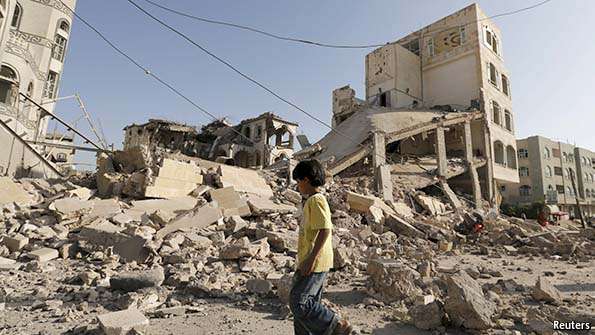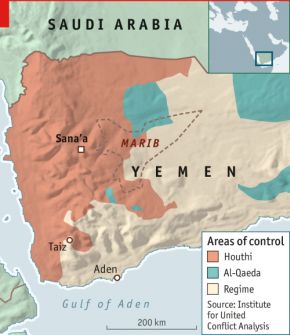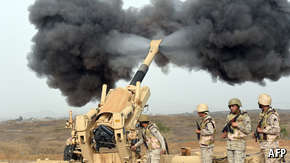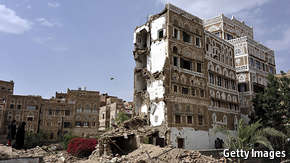
THE start of this month could well come to be seen as the moment Yemen descended into a prolonged, uncontrollable war. The conflict in the desperately poor nation was already going horribly badly. But the Saudi-led coalition fighting the country’s Houthi rebels has now intensified its campaign, after 60 of its soldiers were killed in a single attack in Marib on September 4th.
Immediately afterwards the United Arab Emirates (UAE), which lost 45 men, vowed to be “steadfast” in the face of the largest loss suffered by its armed forces since the nation’s founding in 1971. Saudi Arabia dispatched more elite forces to join the 3,000-strong coalition force already on the ground, while Qatar, hitherto only participating in air operations, has sent 1,000 soldiers. Bahrain’s King Hamad bin Isa al-Khalifa said his two sons will join the battle. Sudanese troops are reportedly waiting to be shipped out of Khartoum.

The coalition has since unleashed an unprecedented flurry of airstrikes in both the northern governorate of Saada, the stronghold of the Houthi rebels, and the country’s capital, Sana’a. Residents say as many civilian as military targets being hit, including houses, restaurants and main streets. “The coalition has gone wacko since the attack,” says Hassan Boucenine, who heads the Yemen office of Doctors without Borders, an NGO.
The action certainly has the whiff of revenge. Onlookers have already been questioning what the coalition’s campaign, now in its sixth month, hopes to achieve. It is unclear how much support Iran has given to the Houthis, which is one of the main justifications for the coalition’s campaign. Quashing the Shia Houthis is nigh on impossible too. Gulf officials and media talk bombastically of preparations to take back Sana’a from the Houthis and reinstall Abd Rabbu Mansour Hadi as president (the Houthis drove him out of the country in March). But Yemen has long been treacherous territory for foreign invaders, and Gulf armies are relatively inexperienced.
Since committing ground troops in August, the coalition has taken control of Aden, the southern port city, and is advancing on Taiz. But it is struggling in Marib, the gateway to Sana’a, where the extra troops, backed by armoured vehicles, missiles and missile-launchers, are said to be massing. The fighting will only get harder since the Houthis’ remaining strongholds are in mountainous redoubts rather than flat plains. “Taking Sana’a and other places would require Yemeni forces,” says Hakim al-Masmari, the editor of the Yemen Post, a local paper. “When Gulf forces move, they are vulnerable to attacks.”
The high toll exacted on civilians may be losing the coalition the support of allied fighters on the ground: a mixture of tribesmen, units of the fractured army and Islamist types, including al-Qaeda fighters. “Everyone has now lost someone,” says Mr Boucenine. He says civilians make up an increasing proportion of the death toll, which is now approaching 5,000.
Unfortunately for war-weary Yemenis, attempts to broker a peace deal earlier this month in Oman were floundering even before the attack in Marib. One problem is that, as with other conflicts in the region, international pressure is lacking. America is deeply unhappy with the way its Gulf allies are waging the war, but is keen to repair relations its relations with them in the wake of the Iran deal, which the Gulf monarchies opposed. And a rising generation of young, ambitious Gulf royals appears unwilling to pare back their newfound military adventurism.
Aid workers fret that their warnings of impending tragedy are falling on deaf ears. Thanks to the coalition’s embargo, designed to stop Iran sending supplies to the Houthis, only 20% of the usual number of ships are arriving in Aden, for a nation that even before the war relied almost entirely on imports. Some medical supplies, such as dialysis equipment, have run out completely. Yemen could still be brought back from the brink. But increasingly it looks like the opportunity to do so will be lost.

